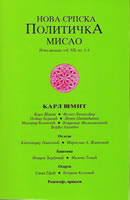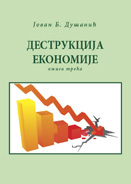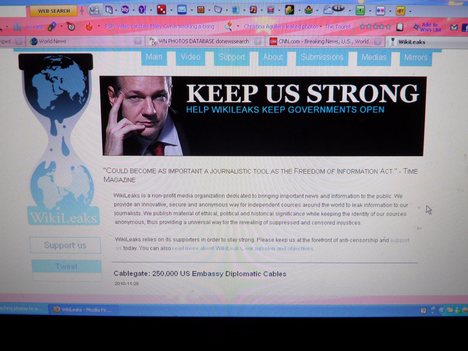| Wikileaks на НСПМ | |||
Post ICJ Opinion: Serbia to Continue Obstructing Kosovo |
 |
 |
 |
| понедељак, 20. децембар 2010. | |||||||||||
|
To understand the justification used for the classification of each cable, please use this WikiSource article as reference.
VZCZCXRO5704 RR RUEHAG RUEHDBU RUEHFL RUEHKW RUEHLA RUEHNP RUEHROV RUEHSL RUEHSR DE RUEHBW #0003/01 0121330 ZNY CCCCC ZZH R 121330Z JAN 10 FM AMEMBASSY BELGRADE TO RUEHC/SECSTATE WASHDC 0565 INFO EUROPEAN POLITICAL COLLECTIVE RHEHAAA/NATIONAL SECURITY COUNCIL WASHINGTON DC RHMCSUU/EUCOM POLAD VAIHINGEN GE RUCNDT/USMISSION USUN NEW YORK 0010 Tuesday, 12 January 2010, 13:30 C O N F I D E N T I A L SECTION 01 OF 04 BELGRADE 000003 NOFORN SIPDIS AMEMBASSY ANKARA PASS TO AMCONSUL ADANA AMEMBASSY ASTANA PASS TO AMCONSUL ALMATY AMEMBASSY BERLIN PASS TO AMCONSUL DUSSELDORF AMEMBASSY BERLIN PASS TO AMCONSUL LEIPZIG AMEMBASSY BELGRADE PASS TO AMEMBASSY PODGORICA AMEMBASSY HELSINKI PASS TO AMCONSUL ST PETERSBURG AMEMBASSY ATHENS PASS TO AMCONSUL THESSALONIKI AMEMBASSY MOSCOW PASS TO AMCONSUL VLADIVOSTOK AMEMBASSY MOSCOW PASS TO AMCONSUL YEKATERINBURG EO 12958 DECL: 2020/01/12 TAGS PGOV, PREL, KV, SR SUBJECT: Post ICJ Opinion: Serbia to Continue Obstructing Kosovo Independence CLASSIFIED BY: Bradford J. Bell, Acting Economics Chief, US Department of State, Economics Section; REASON: 1.4(B), (D) Summary ------- ¶1. (C) We expect Serbia will continue to obstruct and undermine Kosovo’s sovereignty in the lead up to and following the International Court of Justice’s advisory opinion, which most believe will be ambiguous. Regardless of the position taken by the ICJ, Kosovo’s independence and sovereignty are irrefutable. Serbia’s government is unified in its refusal to accept that fact but is internally divided regarding how to push its claim to Kosovo after the ICJ issues its opinion in spring 2010. President Boris Tadic and his office appear willing to follow our and the EU’s advice and to quietly accept any outcome while moving Serbia toward EU integration, but are lacking a coordinated plan to do so. In contrast, Foreign Minister Vuk Jeremic, driven by personal interest in self promotion and a misperception of the domestic political landscape, is planning a new diplomatic offensive on Kosovo on the heels of any ICJ opinion. Absent an alternative approach by Tadic, we expect Jeremic’s more confrontational plan will win out. To temper Serbia’s post ICJ strategy and to limit its duration and impact, we will need to be well coordinated with our EU allies and encourage the EU to wisely use its significant remaining carrots and sticks with Serbia to elicit the cooperative resolution of this issue, while assuring Kosovo’s territorial integrity. We must also be prepared to fight Serbia in the UNGA if necessary. End Summary. Preparing for the Advisory Opinion ---------------------------------- ¶2. (C) Over the next several months as the ICJ deliberates, we expect Foreign Minister Jeremic to maintain an offensive posture and continue his globe spanning travels, heralding the upcoming ICJ decision at each stop. He will try to prevent any further recognitions of Kosovo during this interim period and to shore up support from Serbia’s allies, particularly Russia, the EU non-recognizers (Cyprus, Greece, Romania, Slovakia and Spain) and members of the Non-Aligned Movement. Previewing his intentions, Serbian media reported on December 25 that Jeremic sent a letter to foreign ministers of countries which have not recognized Kosovo, expressing gratitude for upholding the UN Charter and the hope that they would continue to respect Serbia’s sovereignty and territorial integrity. In addition, Jeremic wrote that the ICJ opinion “must not be obstructed in any way,” suggesting that political meddling could influence the court’s opinion. Absent direct intervention from President Tadic, we expect Jeremic will continue his quixotic global campaign with vigor. ICJ Opinion Likely to be Ambiguous ---------------------------------- ¶3. (C) The Serbian government expects the ICJ to deliver its opinion to the UN General Assembly by spring 2010. Media and analysts have speculated that the most likely scenario is for the ICJ to issue multiple opinions, with some supporting Kosovo and others Serbia. Kosovo Minister Goran Bogdanovic told local media on December 25 that he expected there would be significant political pressure to make the ICJ’s decision “more neutral.” Serbia is thus preparing for an outcome that remains ambiguous, with both sides claiming victory. While the ruling’s expected ambiguity could provide Serbia an opportunity to end its campaign against Kosovo, Foreign Minister Jeremic has already said Serbia will take no action that implies Serbia’s recognition of Kosovo (reftel). ¶4. (C) Serbian politicians, including influential Minister of Labor and Social Affairs Rasim Ljajic, have told us that Serbia cannot merely forget Kosovo out of fear that the vocal and numerous opposition will accuse Tadic of treason. Ljajic pointed to the recent Progressive (SNS) victory in the Belgrade municipality of Vozdevac as a clear sign that the opposition has the potential to BELGRADE 00000003 002 OF 004 pose a real threat to the governing coalition. As a result, Serbian officials are now contemplating how vocal and obstructive the GoS should be after any final ICJ ruling in order to assure their political majority. Tadic’s Unclear Path -------------------- ¶5. (C) Over the past month several European interlocutors have stressed with President Tadic the need to move beyond Kosovo and to focus on Serbia’s European integration. We believe the message is beginning to sink in with Tadic, but he still lacks a coordinated strategy to implement. Tadic’s National Security Advisor, Miki Rakic, told Charge Brush on December 10that the government still had no plan for its post-ICJ policy and was only then beginning to consider alternatives. In separate meetings with Charge Brush on December 28 and 29, Defense Minister Sutanovac and informal presidential advisor Srdjan Saper both seemed confused when Charge Brush asked about Tadic’s post-ICJ strategy, with neither even willing to speculate on what the President might be thinking. ¶6. (C) EU sources in Belgrade confirm that during his December 15 meeting with Tadic EU Director General for Foreign Affairs Robert Cooper encouraged Serbia to think carefully about how it would handle Kosovo issues after the ICJ opinion. According to our EU sources, Tadic and his foreign policy advisor Jovan Ratkovic told Cooper that Serbia was currently analyzing four possible post ICJ scenarios, but had yet to “draw any firm conclusions.” Specifically Tadic mentioned consideration of the China-Taiwan model and the “two Germanies” scenario, recognizing that any outcome would need to be tailored to Kosovo’s “special situation.” Tadic reportedly told Cooper that after the ICJ advisory opinion Belgrade would be more than ready to talk to Pristina -even directly- as long as talks were not perceived or portrayed as Serbia directly or indirectly recognizing Kosovo. Thoughts of Partition still in their Heads ------------------------------------------ ¶7. (C) Tadic reportedly told Cooper that he recognized that there needed to be a degree of clarity and finality to any outcome, cognizant that the EU would be unwilling to accept another “Cyprus-like” state as a member. Ratkovic more explicitly told Cooper that while Belgrade would need to accept that it would not govern Kosovo again, Kosovo would have to come to the realization that it would not effectively be able to extend its governance north of the Ibar river. Tadic reiterated to Cooper that ultimately Serbia’s post ICJ strategy was being developed to avoid Serbia being a problem to its international partners but where its “concerns were taken care of.” ¶8. (C) Belgrade’s Quint (U.S., UK, Germany, France, Italy) have frequently discussed the seriousness of Serbia’s plans. Although listening to FM Jeremic would lead one to believe that the Minister actually has a plan for new status talks, neither he nor any other GoS official has ever publicly fleshed out Serbian goals, much less the details for any such talks. In a January 6 conversation with ChargC) Brush, Ratkovic would say only that “Serbia did not send the Kosovo issue to the ICJ just to have it come back and blow everything up; we will use the ruling to increase regional stability.” Jeremic’s Preferred Path ------------------------ ¶9. (C) Despite claims from MFA Political Director Borko Stefanovic BELGRADE 00000003 003 OF 004 to Charge Brush on December 21 that the MFA was seeking “a way out of its Kosovo strategy post ICJ” we believe FM Jeremic intends to continue to beat the Kosovo drum throughout 2010. Jeremic is reportedly championing an alternative scenario under which the GoS would seek to “legalize any ICJ opinion,” as MFA State Secretary Stefanovic told Cooper on December 14. Serbia’s goal could be to again use the UN to bolster the political legitimacy of its stance against Kosovo’s independence. We expect the MFA envisions a multi-month process during which Serbia would try to persuade the UN General Assembly to adopt a resolution welcoming the ICJ ruling (or perhaps the portions favorable to Serbia’s position) and calling for new negotiations as a result. If the UN effort is unsuccessful, the GoS might energize the NAM to issue a statement calling for new talks. ¶10. (C) Under Jeremic’s scenario we expect Serbia would aim to reopen negotiations on Kosovo’s status. The MFA would likely not seek direct talks with Pristina authorities but rather would insist upon a new, “impartial” international negotiator from a non-recognizing country. While Serbia’s goal would be to reopen talks, it would not be in any hurry to conclude them and instead would try to drag out any talks for years. The ruling Democratic Party (DS) would likely want to postpone any result until after parliamentary elections scheduled at the latest for May 2012. EU’s Carrots and Sticks ----------------------- ¶11. (C) While no EU state expects Serbia to recognize Kosovo, Serbia’s EU path will remain muddled without recognizable and accepted borders between Serbia and Kosovo. The EU must lead the charge in making this clear to Serbia. The EU must be willing to offer Serbia carrots and sticks until there is a clearly accepted understanding of where Serbia ends and the Republic of Kosovo begins, while maintaining Kosovo’s current territorial integrity. Levers at the EU’s disposal include determining when to unblock the SAA with Serbia, the disbursement of IPA funds, and the speed with which the EU will consider Serbia’s recently submitted application for EU candidacy. We also must be wary of EU states offering Serbia the wrong carrots. The UK Ambassador to Belgrade recently suggested to us that we should no longer push for additional countries to recognize Kosovo, in an effort to dissuade Jeremic from his own globe-trotting efforts to dissuade recognitions. U.S. Approach ------------ ¶12. (C) The arrival of the new U.S. Ambassador, coupled with two upcoming CODELS (Voinovich and Pomeroy), may provide the USG excellent opportunities to help President Tadic orient his rhetoric to European integration and the benefits thereof. During his December 15 meeting with Secretary Clinton, Jeremic invited her to visit Serbia in 2010. A visit in advance of the ICJ decision (the first since Powell visited in 2003 for PM Djindjic’s funeral) would highlight USG support for Tadic’s EU path and help steer him away from any pressure to consider new status negotiations. Comment ------- ¶13. (C) If Belgrade follows the path that President Tadic appears to favor, Serbia will be able to move forward with EU integration while still not recognizing Kosovo. If however, when the ICJ opinion is issued, Jeremic is the only one with a plan, the GOS is likely to pursue the misguided idea of continuing to battle in the UNGA. This course will at least delay and at worse threaten BELGRADE 00000003 004 OF 004 Serbia’s EU aspirations. In either case, we must snuff out any further roundabout talk on partition by both President Tadic and Foreign Minister Jeremic. ¶14. (C) We must use the next few months before the ICJ issues its opinion to press Tadic to put the battle for Kosovo behind him once and for all and focus all of his government’s energy on EU accession. The initial step is to encourage our EU Quint members to clearly state to Jeremic and Tadic that Serbia risks complicating its EU path if it continues to push for new status negotiations after an ICJ opinion. EU Quint members in Belgrade have told us they intend to meet with Jeremic soon to stress this specific point, pending guidance from their capitals. This message, however, will need to be reinforced directly by EU capitals and from Brussels. If our strategy is to be effective, we need to encourage Brussels to have a clear, coordinated policy regarding the linkage between Serbia’s EU path and resolving practical issues with Kosovo. If Serbia fails to heed this message we and our like minded European partners will need to prepare to defeat any new Kosovo resolution in the UNGA next fall. This will require an aggressive strategy to counter Serbia’s lobbying. ¶15. (C) Any strategy must include a coordinated statement from Washington and European capitals at the highest levels that Kosovo’s partition is not an option and that continued defacto partition through Serbian interference will also put Serbia’s EU membership on hold. This will require a coordinated effort with the European Union, which must be persuaded to use its leverage in tangible ways. A visit by the Secretary or Deputy Secretary to Belgrade before the ICJ ruling would help solidify this message both in Belgrade and in EU capitals. End Comment. PEDERSON |
|||||||||||

.jpg)








 Understanding cables
Understanding cables 











